Today Current Affairs: 20th July 2021 for UPSC IAS exams, State PSC exams, SSC CGL, State SSC, RRB, Railways, Banking Exam & IBPS, etc
Table of Contents
MH-60R Multi Role Helicopters (MRH):
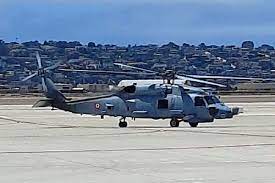
Indian Navy accepted the first two of its MH-60R Multi Role Helicopters (MRH) from US Navy in a ceremony held at Naval Air Station North Island, San Diego on 16 Jul 21. The ceremony marked the formal transfer of these helicopters from US Navy to Indian Navy.
- MH-60R helicopters manufactured by Lockheed Martin Corporation, USA is an all-weather helicopter designed to support multiple missions with state of the art avionics/ sensors.
- 24 of these helicopters are being procured under Foreign Military Sales from the US Government.
- The helicopters would also be modified with several India Unique Equipment and weapons.
- The induction of these MRH would further enhance Indian Navy’s three dimensional capabilities.
- In order to exploit these potent helicopters, the first batch of Indian crew is presently undergoing training in USA.
Moon Wobble:

Sometimes, the moon seems to move in mysterious ways. It is mostly circles and ovals. But there is also something else a so-called wobble animating those rotations and revolutions. According to a recent study, the phenomenon is expected to lead to more flooding here on Earth in the middle of the next decade.
- The moon wobble is nothing but a regular swaying in the moon’s orbit.
- It was first documented way back in 1728.
- This wobble takes over an 18.6-year period to complete, and continues in a cyclic fashion.
- The moon wobble impacts the gravitational pull of the moon, and therefore, indirectly influences the ebb and flow of tides here on the Earth.
- In fact, as per the NASA study, each wobble cycle has the power to amplify and suppress the tides on Earth.
- One half of the 18.6-year cycle suppresses the tides, which means that the high tides get lower, while the low tides get higher than normal.
- Once this cycle completes, the situation flipsin the subsequent cycle, the tides are amplified, with high tides getting higher and low tides, lower!
- The lunar cycle is expected to shift again by mid-2030, and in the coming phase, the tides will amplify once again.
- The upcoming changes in the lunar cycle will pose a serious threat, as the amplified high tides coupled with the rising sea levels will make the risk of flooding far greater across all coastal regions of the globe.
- The study predicts that the high tide-associated floods also known as nuisance floods or sunny day floods may occur in clusters that could last for months or even for longer periods!
Midday Meal Scheme:
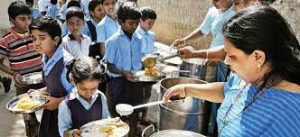
A new study on the intergenerational benefits of India’s Midday Meal Scheme was published.
- It found that midday meals leave a long-lasting impact. Children of mid-day meal scheme beneficiaries show better growth.
- The study used the nationally representative data on cohorts of mothers and their children by birth year and socio-economic status spanning 23 years.
- It is a first-of-its-kind inter-generational analysis of the impacts of a mass feeding programme.
Height-to-Age Ratio :
- Girls who had access to the free lunches provided at government schools, had children with a higher height-to-age ratio than those who did not.
Linkage of Midday Meal & Stunting:
- By 2016, the prevalence of stunting was significantly lower in areas where the mid scheme was implemented in 2005.
- The linkages between midday meals and lower stunting in the next generation were stronger in lower socio-economic strata and likely work through women’s education, fertility, and use of health services.
Interruption:
- The interruptions to schooling and to the midday meal scheme could have even longer term impacts, hurting the nutritional health of the next generation as well.
About Midday Meal Scheme:
- The Midday meal scheme (under the Ministry of Education) is a centrally sponsored scheme which was launched in 1995.
- It is the world’s largest school meal programme aimed to attain the goal of universalization of primary education.
- Provides cooked meals to every child within the age group of six to fourteen years studying in classes I to VIII who enrolls and attends the school.
- Objective: Address hunger and malnutrition, increase enrolment and attendance in school, improve socialisation among castes, provide employment at grassroot level especially to women.
Plea Challenges Sedition Law:
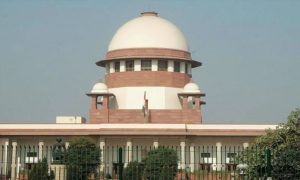
A petition was filed in the Supreme court (SC), that seeks a relook into the Sedition Law.
- The nearly-60-year old judgment helped sedition to survive in Indian Penal Code.
- The 1962 judgment in the KedarNath case, which upheld Section 124A (sedition), a relic of the colonial legacy, was given at a time when doctrines such as ‘chilling effect’ (Deterring effect resulting from restrictive law) on free speech were unheard of.
- It was delivered at a time when scope and inter-relationship of fundamental rights were rather restrictive.
- In the Kedar Nath judgment, the court had reasoned that without Section 124A, the State would be in jeopardy if the government was subverted. It, however, said that Section 124A would apply only to expressions that either intended to or had the tendency to cause violence were punishable as ‘sedition’.
Court’s Ruling:
- It sends a strong message to the government that sedition is being misused by the authorities to trample upon citizens’ fundamental rights of free speech and liberty.
- SC made it clear that the court is sensitive to the public demand to judicially review the manner in which law enforcement authorities are using the sedition law to control free speech and send journalists, activists and dissenters to jail, and keep them there.
- Section 124A of the Indian Penal Code may have passed its time.
- The Court said “a statute criminalising expression based on unconstitutionally vague definitions of ‘disaffection towards Government’ etc. is an unreasonable restriction on the fundamental right to free expression guaranteed under Article 19 (1)(a) and causes constitutionally impermissible ‘Chilling Effect’ on speech”.
Sedition Law:
- Sedition laws were enacted in 17th century England when lawmakers believed that only good opinions of the government should survive, as bad opinions were detrimental to the government and monarchy.
- The law was originally drafted in 1837 by Thomas Macaulay, the British historian-politician, but was inexplicably omitted when the Indian Penal Code (IPC) was enacted in 1860.
- Section 124A was inserted in 1870 by an amendment introduced by Sir James Stephen when it felt the need for a specific section to deal with the offence.
- It was one of the many draconian laws enacted to stifle any voices of dissent at that time.
- It was used by the British to silence Mahatma Gandhi and Bal Gangadhar Tilak.
- Sedition Law Today: Sedition is a crime under Section 124A of the Indian Penal Code (IPC)
State Of Food Security And Nutrition In The World:

A report titled ‘The State of Food Security Nutrition in the World 2021 (SOFI)’ has studied the impact of Covid-19 pandemic-induced income loss on food intake and malnutrition.
- The report is presented by the Food and Agriculture Organization of the United Nations, the International Fund for Agricultural Development, the United Nations Children’s Fund, the World Food Programme and the World Health Organization.
- Earlier, the Global Food Policy Report 2021 (released by the International Food Policy Research Institute (IFPRI)) stated that the impacts of rising poverty and reduced livelihoods are reflected clearly in rising levels of food insecurity and decreasing diet quality.
- The biggest impact of Covid-19 on food security has been on almost all low-and middle-income countries.
- Moreover, those countries where there were climate-related disasters or conflict or both along with economic downturns as a consequence of the pandemic containment measure, suffered the most.
- More than half of the world’s undernourished are found in Asia (418 million) and more than one-third in Africa (282 million).
- Compared with 2019, about 46 million more people in Africa, 57 million more in Asia, and about 14 million more in Latin America and the Caribbean were affected by hunger in 2020.
- Likely to Miss SDG Targets: Globally, the world is not on track to achieve sustainable development goals (eliminating poverty (SDG 1) and hunger (SDG 2)) targets for any of the nutrition indicators by 2030.
- This can be reflected in the finding that, after remaining virtually unchanged for five years, the prevalence of undernourishment (PoU) increased 1.5 percentage points in just one year.
- Efforts to eradicate malnutrition in all its forms have been challenged by disruptions in essential nutrition interventions and negative impacts on dietary patterns during the Covid-19 pandemic.
Mekedatu Dam Project:
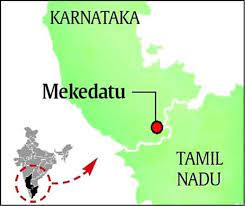
The Centre has given its assurance that Karnataka will not be allowed to carry out any construction on the Mekedatu dam project on the Cauvery river until its Detailed Project Report (DPR) is approved by the Cauvery Water Management Authority (CWMA).
- Mekedatu, meaning goat’s leap, is a deep gorge situated at the confluence of the rivers Cauvery and its tributary Arkavathi.
- The project aims to store and supply water for drinking purposes for the Bengaluru city. Around 400 megawatts (MW) of power is also proposed to be generated through the project.
- However, Tamil Nadu objected saying that the project would affect the flow of Cauvery water to Tamil Nadu. Tamil Nadu also argues that the project is against the final order of the Cauvery Water Disputes Tribunal (CWDT) in which the SC held that no state can claim exclusive ownership or assert rights to deprive other states of the waters of inter-state rivers.
Cauvery River:
- Origin: River rises on Brahmagiri Hill of the Western Ghats in south-western Karnataka state.
- The river basin covers three states and a Union Territory: Tamil Nadu, 43,868 square kilometres, Karnataka, 34,273 square kilometres l, Kerala, 2,866 square kilometres and Puducherry.
- Key tributaries: Hemavati, Lakshmantirtha, Kabini, Amaravati, Noyil, and Bhavani rivers.
- Falls along the way: Upon entering Tamil Nadu, the Kaveri continues through a series of twisted wild gorges until it reaches Hogenakal Falls.
- Dams: There the Mettur Dam was constructed for irrigation and hydel power in Tamil Nadu.
Tipu Sultan:

Mysore King Tipu Sultan is at the centre of controversy in the Brihanmumbai Municipal Corporation over attempts to name a garden after him in Govandi, a suburb in Eastern Mumbai.
- A local corporator had suggested that a newly developed garden be named after Tipu Sultan as he was a “freedom fighter” and had fought against the British East India Company.
- The demand was accepted by the BMC administration in June and sent to the Market and Garden Committee for approval on July 15.
- The move, however, drew criticism from the opposition who claimed that Tipu Sultan was an anti-Hindu leader and naming a garden after him would hurt religious sentiments of the community.
Tipu Sultan:
- He was a ruler of the Kingdom of Mysore and the eldest son of Sultan Hyder Ali of Mysore.
- In the wider national narrative, Tipu has so far been seen as a man of imagination and courage, a brilliant military strategist who, in a short reign of 17 years, mounted the most serious challenge the Company faced in India.
- Fought the first Anglo-Mysore War (1767-69) at the age of 17 and subsequently, against the Marathas and in the Second Anglo-Mysore War (1780-84).
- He fought Company forces four times during 1767-99 and was killed defending his capital Srirangapatnam in the Fourth Anglo Mysore War.
- Tipu reorganised his army along European lines, using new technology, including what is considered the first war rocket.
- Devised a land revenue system based on detailed surveys and classification, in which the tax was imposed directly on the peasant, and collected through salaried agents in cash, widening the state’s resource base.
- Modernised agriculture, gave tax breaks for developing wasteland, built irrigation infrastructure and repaired old dams, and promoted agricultural manufacturing and sericulture. Built a navy to support trade.
Khushiyon Ka Aashiyana:

Pradhan Mantri Awas Yojana – Urban (PMAY-U) has launched Khushiyon Ka Aashiyana – Short Film contest 2021 to take ahead the Prime Minister’s vision of ‘Housing for All’.
- Ministry of Housing and Urban Affairs (MoHUA) announced it on the occasion of sixth anniversary of PMAY-U on June 25, 2021.
- For the short film contest, applications are invited from PMAY-U beneficiaries, students, youth, members of the civil society, institutions and individual/groups on the broad theme of six years journey of PMAY-U Mission and how it has impacted lives of people, thereby bringing transformation, dignity and enabling empowerment.
- The competition is open to all Indian Nationals above the age of 18 years and the final date for submission is September 1.
- The results will be declared on September 30, 2021 and 25 each winners will be rewarded in three categories with cash prizes of Rs 25000, Rs 20000 and Rs 12500 along with certificate.
Conjugal Rights Under Hindu Personal Laws.:
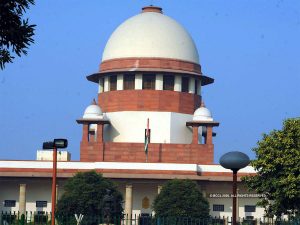
The Supreme Court is expected to begin hearing a fresh challenge to the provision allowing restitution of conjugal rights under Hindu personal laws.
- Section 9 of the Hindu Marriage Act, 1955 deals with restitution of conjugal rights.
- Conjugal rights are rights created by marriage, i.e. right of the husband or the wife to the society of the other spouse.
- The law recognises these rights— both in personal laws dealing with marriage, divorce etc, and in criminal law requiring payment of maintenance and alimony to a spouse.
- Section 9 of the Hindu Marriage Act recognises one aspect of conjugal rights — the right to consortium and protects it by allowing a spouse to move court to enforce the right.
Rights be enforced:
- When either the husband or the wife has, without reasonable excuse, withdrawn from the society of the other, the aggrieved party may apply, by petition to the district court.
- And the court, on being satisfied of the truth of the statements made in such petition and that there is no legal ground why the application should not be granted, may decree restitution of conjugal rights accordingly.
- Also, if a spouse refuses cohabitation, the other spouse can move the family court seeking a decree for cohabitation.
- If the order of the court is not complied with, the court can attach property. However, the decision can be appealed before a High Court and the Supreme Court.
Awas Par Samvaad:

Pradhan Mantri Awas Yojana – Urban (PMAY-U) has launched Awas Par Samvaad – series of 75 seminars and workshops to take ahead the Prime Minister’s vision of ‘Housing for All’.
- Ministry of Housing and Urban Affairs (MoHUA) announced it on the occasion of sixth anniversary of PMAY-U on June 25, 2021.
- ‘Awas Par Samvaad’ aims to create awareness and promote discussion, deliberation and dissemination on ‘Housing for All’ among multiple stakeholders belonging to varied streams of learning and practices, e.g. engineering, urban community development, planning, finance, etc.
- This will be done through 75 nation-wide workshops and seminars to be conducted between July 1 to September 30, 2021 by educational institutions and Primary Lending Institutions in association with States/UTs.
- These workshops can be held offline through a classroom model, adhering to all COVID-19 best practices or via online medium. MoHUA will issue certificate of participation to all participants.
Vintage Motor Vehicles.:

The Ministry of Road Transport and Highways has amended CMVR 1989, formalising the registration process of vintage motor vehicles. This is aimed at preserving and promoting the heritage of old vehicles in India.
Salient Features:
- All 2/4 wheelers, 50+ years old, maintained in their original form and which have not undergone any substantial overhaul, shall be defined as Vintage Motor Vehicles.
- Application for registration/re-registration shall be made as per Form 20 and shall be accompanied by an insurance policy, fee, bill of Entry in case of imported vehicles, and old RC in case of an already registered vehicle in India.
- The State Registering Authority shall issue a certificate of registration as per Form 23A, within 60 days.
- Vehicles already registered can retain their original Registration Mark. However, for fresh registration, registration mark will be assigned as “XX VA YY*”, where VA stands for vintage, XX stands for State Code, YY will be a two-letter series and “8” is a number from 0001 to 9999 allotted by the State Registering Authority.
- Fees for a new registration – Rs. 20,000 and subsequent re-registration – Rs. 5,000.
- Vintage motor vehicles shall not be driven on roads for regular/commercial purposes.
Pegasus Spyware:

It has been reported that Pegasus, the malicious software, has allegedly been used to secretly monitor and spy on an extensive host of public figures in India.
About Pegasus:
- It is a type of malicious software or malware classified as a spyware.
- It is designed to gain access to devices, without the knowledge of users, and gather personal information and relay it back to whoever it is that is using the software to spy.
- Pegasus has been developed by the Israeli firm NSO Group that was set up in 2010.
- The earliest version of Pegasus discovered, which was captured by researchers in 2016, infected phones through what is called spear-phishing – text messages or emails that trick a target into clicking on a malicious link.
- Since then, however, NSO’s attack capabilities have become more advanced. Pegasus infections can be achieved through so-called “zero-click” attacks, which do not require any interaction from the phone’s owner in order to succeed.
- These will often exploit “zero-day” vulnerabilities, which are flaws or bugs in an operating system that the mobile phone’s manufacturer does not yet know about and so has not been able to fix.
Targets:
- Human Rights activists, journalists and lawyers around the world have been targeted with phone malware sold to authoritarian governments by an Israeli surveillance firm.
- Indian ministers, government officials and opposition leaders also figure in the list of people whose phones may have been compromised by the spyware.
- In 2019, WhatsApp filed a lawsuit in the US court against Israel’s NSO Group, alleging that the firm was incorporating cyber-attacks on the application by infecting mobile devices with malicious software.
Protests In Cuba:

Thousands of Cubans took to the streets across the country to protest longstanding restrictions on rights, scarcity of food and medicines, and the government’s poor response to the Covid-19 pandemic.
- These protests are the biggest anti-government demonstrations on the Communist-run island in decades.
Ongoing Protests:
- The anti-government protests erupted amid Cuba’s worst economic crisis since the fall of the Soviet Union, its former ally, or end of the cold war (1945-1991).
- Cuba has been an authoritarian communist state for more than six decades.
- Cuba has been hit hard by US sanctions and Covid-19.
- Cubans have been angered by the collapse of the economy, food and medicine shortages, price hikes and the government’s handling of the pandemic.
- Protesters shouted “freedom” and demanded for President Miguel Diaz-Canel to step down.
- On the other hand, Cuba’s President blamed the US for the turmoil.
- He called tight sanctions imposed by the US on Cuba, has resulted in a policy of economic suffocation and is the prime reason for protests in Cuba.
- Further, the US President said the US stands with the people of Cuba in their call for freedom.




